Art That Has Endured More Than a 1000 Years
Who will be remembered in 1,000 years?

Hopeful contenders for everlasting fame must run the gauntlet of numerous challenges, including the jealousy of rivals and possible extinction of their own civilisation and language. How practice you remain remembered for generations?
I
I'one thousand in the secluded western corner of London's Highgate cemetery, looking at a large marble tomb. It's long and box-similar, with a life-sized sculpture of a dog slumped at its human foot. The stone is mottled and tendrils of strangling ivy are creeping up its base. An inscription reads "Erected to the memory of Thomas Sayers".
Our guide asks the grouping if anyone has heard of this human being. We milk shake our heads blankly.
At the time of his death the state of affairs was very dissimilar. It was the wintertime of 1865 and Sayers, who began his career as an illiterate bricklayer, had risen to become the most celebrated sportsman of the Victorian historic period.
This was England'southward first bare-knuckle fighting champion. His concluding friction match, which he fought largely one-handed in a Hampshire field, was watched by thousands. Special trains were chartered to ship the spectators, who included fellow Victorian superstars similar the novelists Charles Dickens and William Thackeray. Even the Prime Minister of the day, Lord Palmerston attended; Parliament shortened its hours especially and Queen Victoria asked to be informed of the result.
When he died a few years later, the funeral procession stretched for two miles and included some 100,000 people. The cemetery descended into chaos as people climbed copse and trampled tombstones, hoping for a better view.
One hundred and fifty two years on, his reputation has turned to dust. He's still well known to history buffs and battle obsessives – but to the residue of u.s.a., he needs an introduction.
The steady march of time has left many other like casualties in its wake – people who take risen to dizzying heights of fame just to be largely forgotten. There's the Greek poet Sappho, whose steamy verses titillated audiences for much of antiquity. The verses were and so enchanting, one Athenian lawmaker said he felt that once he'd heard them, he could die.
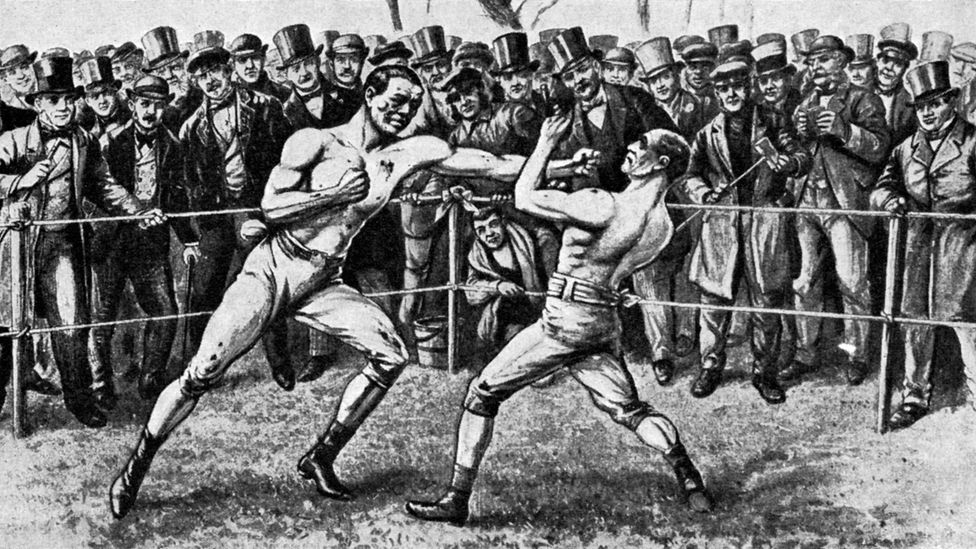
Bare-knuckle boxing match was huge in the Victorian era - but stars similar Thomas Sayers were before long forgotten (Credit: Alamy)
Or how about the celebrity gladiator Spiculus, who roamed the amphitheatres of ancient Rome. The emperor Nero was particularly enamoured with him; when he sensed that his ain murder was imminent, he requested that Spiculus do the honours instead.
Why are some people near instantly forgotten when they have gone, while others cling on, embedding themselves then deeply into our culture that nosotros're still studying them, psychoanalysing them, writing well-nigh their life, death and achievements, fifty-fifty depicting them in films, millennia after they're gone?
Hopeful contenders for everlasting fame must run the gauntlet of numerous challenges, including the jealousy of rivals and possible extinction of their own culture and language. Merely in that location are some clues subconscious in the life stories of those who succeeded and those who were lost along the manner.
Manage your paradigm, merely non also much
A plumbing fixtures place to brainstorm the search is Ancient Greece, where achieving everlasting glory was a national obsession. "They were very, very focused on fame," says Thomas Harrison, professor of Ancient History at the University of St Andrews. "In a funny fashion, it wasn't embarrassing to say that you wanted deathless fame of different sorts, so people talked nearly information technology rather more explicitly."
At the heart of it all was the concept of kleos, which roughly translates as "what others hear nigh you". It was popularised by the poesy of Homer – which has itself endured for thousands of years – and earned past taking smashing risks and making keen sacrifices, especially in battle. Homer's hero Achilles, who died afterward being shot in the heel, is the archetypal example.
"At ane point military leaders were undertaking wars with the specific purpose of getting celebrity," says Lynette Mitchell, an expert in Ancient Greek History and Politics at the University of Exeter.
Equally you might expect, some big names were more than a little preoccupied with the idea. Alexander the Great ruled the kingdom of Macedon from 336-323 BC, expanding information technology from mainland Greece and a handful of Mediterranean islands to a global power that stretched all the way to northwest India.
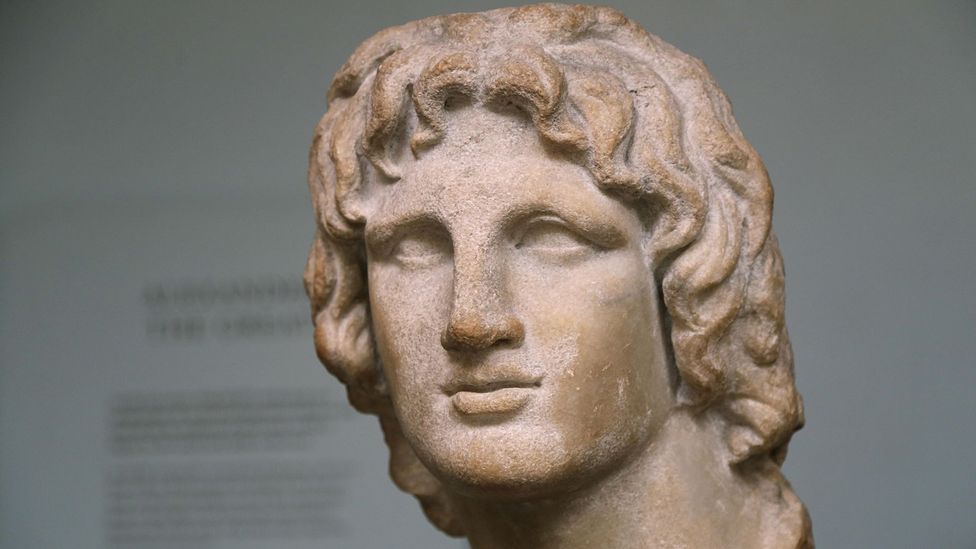
Alexander the Great ensured every coin and statue of him had the same likeness (Credit: Alamy)
Like Julius Caesar, he was a primary of self-promotion, whose avant-garde propaganda machine included – among other things – a troupe of historians who accompanied him on campaigns. "They were kind of writing the history of his campaign equally it was happening," says Harrison. He reportedly only authorised one sculptor to carve his portrait and carefully planned the details of any likenesses that appeared on coins.
This strategy has continued well into the modern age, where it's used by presidents and popular stars alike. But those hoping to be remembered should tread advisedly. "Today celebrities like Bono are undergoing a degree of re-assessment," says Chris Rojek, a sociologist at City, University of London. "The fact that marketing is much more involved in creating these figures means that the social criticism that surrounds them is far more entrenched than it used to be."
Choose your career wisely
Those not lucky enough to be born into power yet take a decent gamble of being remembered, especially if they focus on irresolute the earth through their ideas. Take philosophers. Back in antiquity, they weren't specially well known by the general public. They occupied a rarefied globe and those deemed to be atheists were seen as suspect and weird. Yet thousands of years later, their work withal guides modern thinking and they are so widely known they can be considered to be household names.
"They inverse the manner people thought and that's why they have remained important," says Lynette Mitchell. However, ancient philosophers had the added advantage of fewer competitors – since most people of their time were illiterate – and being first. Finding fame gets harder to achieve without original ideas, but it is still possible to come up with revolutionary thought experiments. Back in 2013 a team of scientists went on the hunt for the world'south most influential academic. They scoured the cyberspace for those who were mentioned the most oftentimes and performed a complex assay. The winner? Karl Marx.
Indeed, as Da Vinci, Galileo and Isaac Newton inch towards a millennium of fame, with Darwin and Einstein clocking upward centuries of renown, it might be tempting to opt for a life in the laboratory. Just alas, nowadays even a Nobel prize probably won't practice the trick. "Science used to be seen as a heroic individual discovery, which was never quite true, just it was more true that it is now," says Harrison.

Karl Marx'south name has endured, even though many communist regimes are no more than (Credit: Alamy)
Not only is scientific discipline now much more collaborative, but as with philosophy, the low hanging fruit have already been plucked. "One of the difficulties facing scientists today is it's difficult to understand what on earth their discoveries mean," he says. As people struggle to grasp blackness holes and string theory, even modern-day geniuses such as Stephen Hawking may be lost – though his life makes for a good story.
Other professions to avert include sport and music. "Sporting heroes bear on a generation, only one time they kickoff to exit of living retentiveness they decline." says Ruth Penfold-Mounce, a sociologist at the Academy of York. "David Beckham will disappear, I'm agape."
Songwriting is especially risky, for i big reason: music tends to date. Of the entire output of the concluding thousand years, very little has endured for more than than a century, apart from classical music. It's hard to imagine our descendants listening to The Beatles in their flying cars and spaceships, with genres evolving at such a step. After all, few people are enlightened of the melodies of St Godric of Finchale, an English hermit and popular medieval saint, who wrote some of the oldest surviving songs in English at effectually the start of the 12th Century.
To stand up the best run a risk of beingness remembered, information technology is maybe best to cull a career in politics – but don't try to copy your heroes from antiquity. From Caesar to Boudica, back then the all-time remembered rulers were renowned for their skill as warriors or military strategists. Those from more recent history – such every bit Nelson Mandela, Abraham Lincoln and Gandhi – are known for leading revolutions or advancing human rights. Drop your weapons and focus on a expert cause.
Finally, you might want to try your hand at literature. Similar ideas, peachy stories just never die. That is, and then long as you make copies. "For ancient writers, it's all a matter of the risk survival of texts," says Harrison. "There are some cases where there'due south only ane surviving copy, and Latin literature would look very dissimilar if that had perished." He gives the instance of Virgil, the Roman poet who – after xi years working on ane text – ordered that it be destroyed on his deathbed. It wasn't quite finished, and he was mortally embarrassed lest anyone see information technology. Luckily his executors kept information technology anyway and it's considered one of the groovy epics of his fourth dimension.
Don't be royal
At kickoff glance, beingness royal seems similar a guarantee of immortality. But Rojek isn't convinced. "Will people remember the Queen in one,000 years? I don't think so," he says. "Regal familes are much more generational – later on they dice someone else comes along. I don't retrieve Princess Diana will be remembered even in 100 years. Henry VIII is famous simply he destroyed a faith, he got rid of the Cosmic Church [in the United kingdom]."
Be lucky
When Tutankhamun took his last, feverish breath in 1323BC, probably in the city of Thebes after contracting malaria, he was just a male child king of xviii. He'due south not known to have achieved anything particularly remarkable. If you were placing bets, y'all probably wouldn't bank on this pharaoh condign a household name several thousand years later. And then something extraordinary happened.
Constructing a pharaoh'southward tomb was a massive undertaking, which required decades of work by plasterers, painters and rock carvers over the form of their reign. But Tutankhamun died suddenly and they ran out of time. Instead he was hastily interred in a minor tomb in a relatively obscure part of the Valley of the Kings. It was sealed before the paint even had a chance to dry. Over years it became buried in rubble and was somewhen lost altogether.
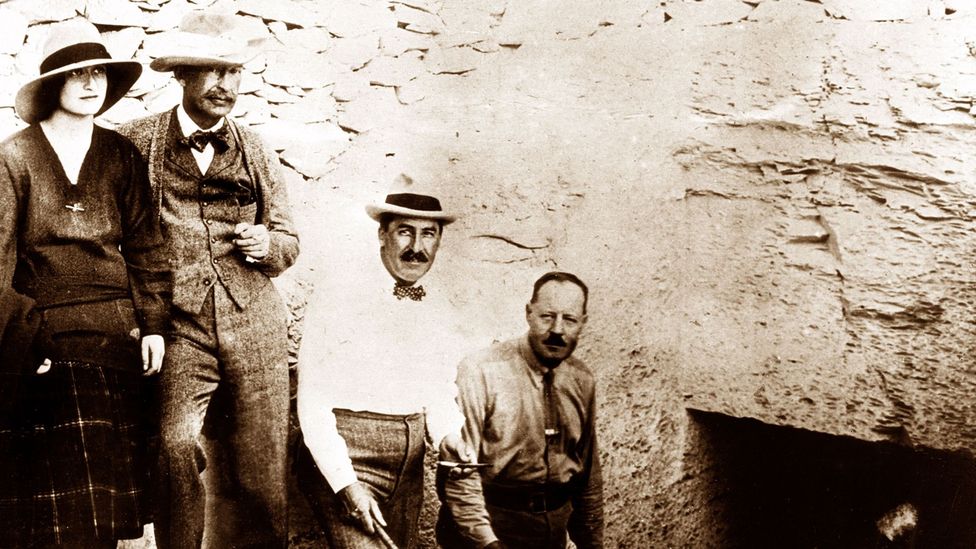
The chance discovery of Tutankhamun's tomb turned an almost forgotten Egyptian ruler into an icon (Credit: Alamy)
When it was discovered by archaeologist Howard Carter and his patron Lord Carnarvon in 1922, it was full of fabled riches across their wildest imaginations. Its location and size had kept them safely hidden away, while all the tombs around it were beingness plundered by looters.
The retention of Tutankhamun has been ensured by the large number of physical artefacts he left behind. His mummy lone has been intensively studied as experts unravel the mystery of his short life and how he died. His fame increases with every headline and documentary. When nosotros think of aboriginal Arab republic of egypt, we recollect Tutankhamun. It doesn't matter that it was all a fluke.
Leave stuff behind
In fact, leaving any kind of physical legacy is extremely helpful. This could come up in the form of the many, many descendants of the 13th-Century Mongol warrior Genghis Khan, whose prolific loins sired one in 200 men live today, or the numerous monuments and coins on which Alexander the Bang-up stamped his image. In China, the emperor Qin Shi Huang secured his lasting memory with the Great Wall of China and the vast Terracotta Army he was cached with – not to mention that he founded an entire land. Become on, requite people something to marvel over.
Die a famous death
Throughout much of history, dying young or dramatically – recollect Cleopatra clutching an asp to her chest – was a crucial tenet of being remembered. Of all the nigh famous people through antiquity, very few of them made it to their 40th birthday.
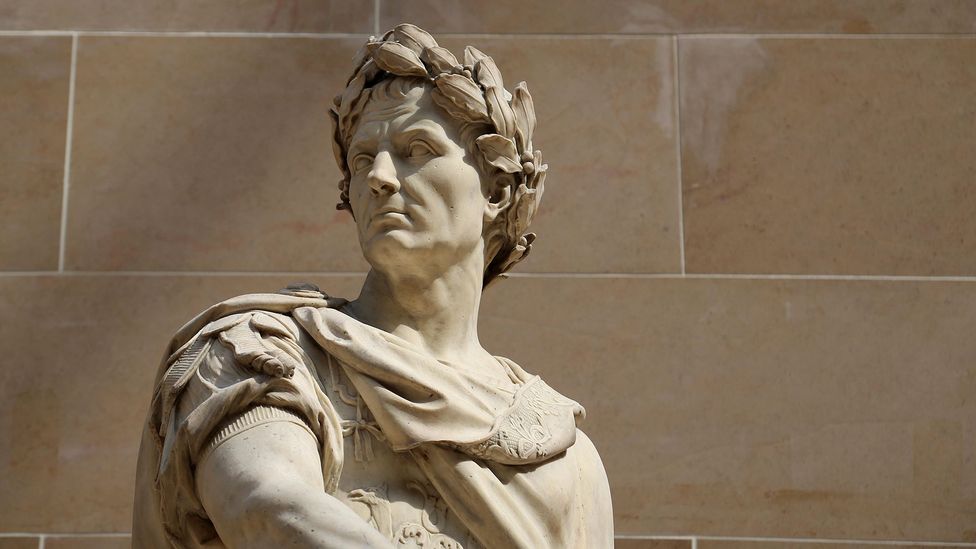
Despite living ii,000 years ago, Julius Caesar's name is however recognisable today (Credit: Alamy)
Plainly, this strategy isn't to be recommended and at that place'southward no guarantee your name will last. Simply under the right weather, a great tragedy need not get in the way of cracking fame. With modern technology information technology'south easier than ever to go on up your image. "There's that fabulous perfume advert where you lot've got Charlize Theron alongside Marilyn Monroe, Grace Kelly and Marlene Dietrich," says Penfold-Mounce. Speaking of Marilyn Monroe, she notes "she'due south notwithstanding very active, considering how dead she is."
Exist a villain
Another route to enduring fame that should non be encouraged is to seek notoriety. From Jack the Ripper and Helm Blackbeard, to Hitler and Ivan the Terrible, many of the best-known characters in history are infamous. "There is a fantasy of the tyrant," says Lynette Mitchell. "It'south one of those images which is really enduring."
The most charismatic have been remembered, with a shudder, for generations. According to Rojek, this has led some to pursue fame the nasty mode. "When Mark David Chapman, who shot John Lennon, was being charged for murder, he said 'in social club to be the well-nigh famous person in the world, I accept to kill the almost famous person in the world'."
It'south worked out for some, but it's a pitiful and unreliable strategy. That's considering i response has been to intentionally wipe villains from history – erasing all traces of their name from the public record, including vehement down everything they've built.
"Even [the Greek historian] Herodotus occasionally says 'he did something and so terrible, I'm not going to mention his name' – there was this idea that you shouldn't talk most bad deeds," says Harrison. "At that place was the sense that they have a power over you, in terms of whether they proper noun you or don't name you."
Constitute a religion
There's mountains of evidence that Jesus Christ, Siddhartha Gautama (known as the Buddha), and many more religious leaders were existent people, though they died many millennia ago. The author L Ron Hubbard proved that founding a organized religion is still possible dorsum in the 50s, when he formed the Church building of Scientology. Equally a result of his teachings, today he's widely recognised as ane of the most influential Americans of all fourth dimension – and the most published and translated writer in the world to boot. Those looking for lasting fame could do worse.
Be mind-bogglingly wealthy
Finally, those hoping to exist remembered should attempt to become heed-bogglingly rich. The saying "they're rich as Croesus", pregnant they're very wealthy, comes from a existent person who lived more than two-and-a-half thousand years ago in mod day Turkey.
King Croesus (pronounced Kree-sas) ruled the kingdom of Lydia for 14 years and is famed for his lavish gifts to the oracles at Delphi, which included a life-sized woman made entirely of aureate, amongst many other ornate treasures. Among historians, he's known for issuing the first pure gold and silverish coins, which revolutionised the ease with which appurtenances were exchanged.
Merely will any well-known figures from recent times be remembered in 1,000 years?
Lynette Mitchell is placing her bets on Alan Turing, who invented the computer. "He has merely just come back into retentiveness in the last few years because proficient stories take been told about him," she says.
For Penfold-Mounce, it'south Donald Trump. "I call up the individuals that volition final from the 21st Century are going to exist some of the big politicians and world leaders. If it's going to exist a toss-up between someone like Theresa May and Donald Trump, I would recall that Trump would be remembered for a long time."
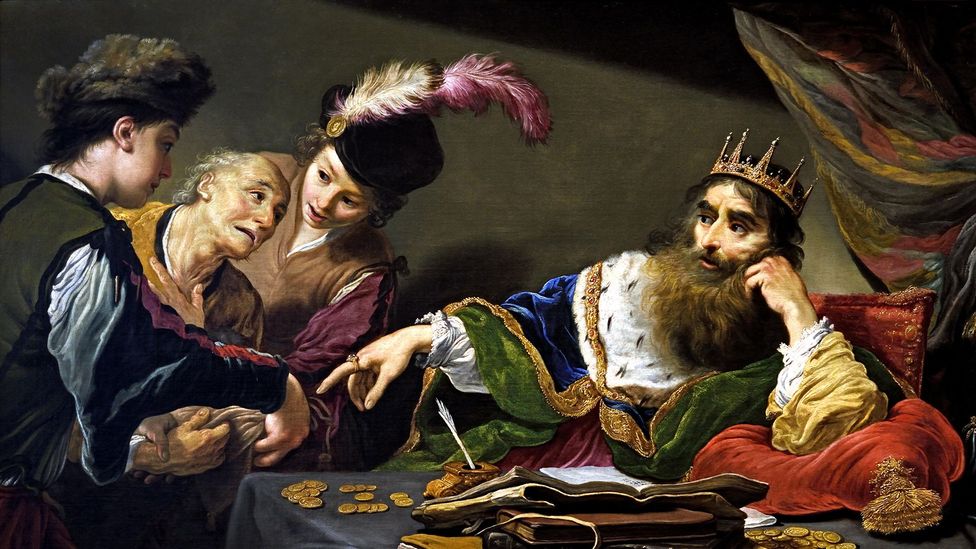
Many people may not know when or where Rex Croesus lived - but they practise know his name (Credit: Alamy)
Harrison agrees. "I don't think public intellectuals are probable to be remembered," he says. "In a funny fashion, in academia you can be sure that you will exist remembered within a very small-scale grouping. I regularly pull books off the shelves that are 100 years old. Only more than widely I think it will be quite like to the ancient world… it'due south not going to be the wrestlers and pop stars who are remembered. It will be the huge political figures, like Trump and Putin."
Rojek is placing his bets on Nelson Mandela. "I think everlasting figures take hold of the spirit of the time and somehow limited it and act as the public face of information technology. Then we don't have to recall too hard about what the time is. They sum it up immediately."
Join 800,000+ Time to come fans by liking usa on Facebook , or follow us on Twitter .
If you liked this story, sign upwardly for the weekly bbc.com features newsletter , called "If You Merely Read six Things This Week". A handpicked choice of stories from BBC Future, Globe, Culture, Capital, and Travel, delivered to your inbox every Friday.
bergevinhanch1998.blogspot.com
Source: https://www.bbc.com/future/article/20171220-how-to-be-remembered-in-1000-years
0 Response to "Art That Has Endured More Than a 1000 Years"
Post a Comment